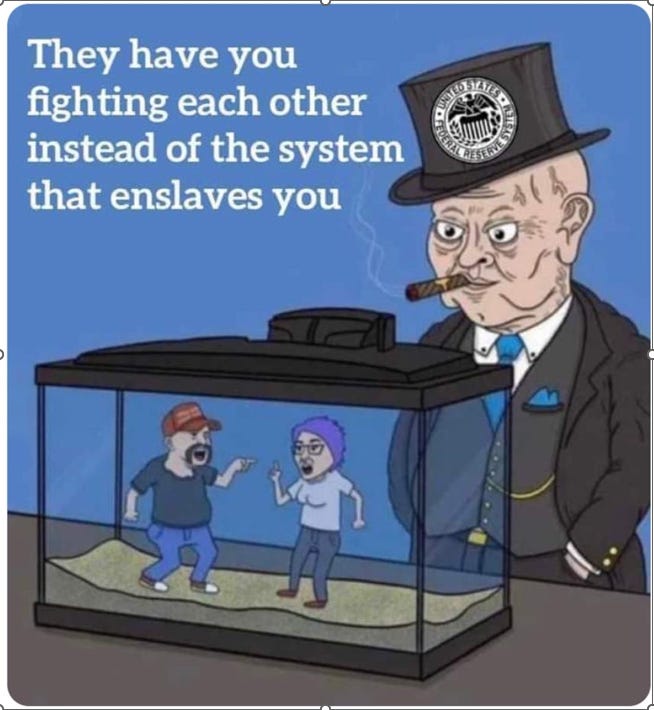Margaret Anna Alice writes about propaganda, mass control, psychology, politics, and health with a focus on COVID at her Substack, Margaret Anna Alice Through the Looking Glass. She is the author of the fairy tale The Vapor, the Hot Hat, & the Witches’ Potion and has presented her research to the Corona Investigative Committee and the World Council for Health. Described as “COVID’s Best Chronicler” by Dr. Meryl Nass and “my favourite writer anywhere” by Dr. Mike Yeadon, Margaret Anna aims to unmask totalitarianism and awaken the sleeping before tyranny triumphs.
‘Malo periculosam, libertatem quam quietam servitutem [I prefer dangerous freedom over peaceful slavery].… It prevents the degeneracy of government, and nourishes a general attention to the public affairs. I hold it that a little rebellion now and then is a good thing, and as necessary in the political world as storms in the physical.’
—Thomas Jefferson in a letter to James Madison, January 30, 1787
‘In a constellation that poses the threat of total annihilation through war against the hope for the emancipation of all mankind through revolution—leading one people after the other in swift succession “to assume among the powers of the earth the separate and equal station to which the Laws of Nature and of Nature’s God entitle them”—no cause is left but the most ancient of all, the one, in fact, that from the beginning of our history has determined the very existence of politics, the cause of freedom versus tyranny.’
—Hannah Arendt, On Revolution (Kindle, paperback, audiobook)
I possess a virulent anti-authoritarian strain dating back to my childhood (ask my father), and I have always found the concept of respecting authority for authority’s sake nonsensical. Respect is something you earn, not deserve. This gives me a natural affinity for anarchism.
Here commences the soundtrack for this post, which draws primarily from Repo Man, a zany anthem to the anarchist-influenced punk movement.
I don’t do labels, so I don’t call myself an anarchist, but I find we are aligned on the values I feel matter the most.
Here are the core values[i] I sketched out for myself:
LIBERTY
• free speech
• individualism
• independent thought
• privacy
• bodily autonomy
COURAGE
• integrity
• responsibility
• resilience
• humility
• justice
LOVE
• peace
• gratitude
• equality
• community
• kindness
REALITY
• truth
• nature
• reason
• clarity
• wisdom
CREATIVITY
• humor
• open-mindedness
• culture jamming
• sober optimism
• joy
I don’t consider myself on the left or the right. As I wrote in a chat with my Nevermore Media colleagues:
‘The left/right paradigm is virtually meaningless now and is only used by the propagandists and their puppeteers to divide, sow hatred, and create in-group/out-group bias. TPTB want to divide the people and keep us busy fighting each other instead of them. Right now, all that matters in my mind is are you pro-freedom or pro-tyranny. The left has gone full-on authoritarian with its pro-censorship, pro-globalist/WEF/Great Reset/COVID agenda, whereas the middle and elements of the right are still open to dialoguing, diversity of thought, and rationality.… I no longer judge by party but by individual politicians’ values, words, and actions.’
In this video, Mark Changizi describes how the political landscape has shifted from left–right to freedom–authoritarian:
Aaron Kheriaty sums it up concisely in this tweet:
https://twitter.com/akheriaty/status/1602818588745773056
Some would call the territory I’ve entered classical liberalism or the intellectual dark web. Others say I’m post-partisan or politically homeless.
I call it being politically agnostic. Really, I call it being free because jettisoning labels has been one of the most liberating acts of my life.
Apparently, I’m not alone. In this interview by Paul Cudenec, once-leftist Foods Not Bombs Founder Keith McHenry states:
‘As free thinkers we can encourage a great transformation of the human spirit where we find solutions outside the left-right paradigm. That discussion and search must continue in earnest. I am done with the left-right divide. It’s now the humans versus the deadly robotic corporate state.’
I love this Russell Blake post so much, I wish I had room to quote it in full, but this should whet your appetite:
‘I find it precious that you still view things in the conditioned manner of red or blue. This is all theater, as anyone paying attention grasps. The entities who own the U.S. are neither dem or republican, just as they are neither white nor black, gay or straight, theist or atheist.
‘They operate the plantation for their profit, power, and control. That’s it. All the issues you’ve been propagandized into caring about quite deeply are as contrived as the cliffhangers in a dime novel. They exist as distractions, to keep you feeling strongly about things that don’t matter. Your outrage is a luxury used against you over and over, just as is your patriotism. You exist as chattel for a debt being created by your governors, from international financial syndicates that now are owed everything in your country as collateral for the debt. Exactly as was done in Greece, and in Argentina, and everywhere this cabal operates. Debt is their weapon, and ‘issues’ are their foot soldiers designed to wear you down until you’re so apathetic you give up, or alternatively so mired in team red or team blue thinking you can no longer see reality.
‘That is the entire point of the government, and of the media. To divide, to distract, and to conquer.’
My close friend and collaborator Visceral Adventure created a striking video to illustrate this very piece:
Diane Perlman published this spectacular Declaration of Independents! in which she calls for us to ‘to liberate ourselves from dualistic, concrete, black-and-white, us/them, right/wrong, good/evil, all or nothing, right/left, Democratic/Republican thinking.’
And Mathew Aldred introduces the concept of a Decentralized-Distributed-Dissident-Collective-Intelligence-Network in this piece.
Modern Heretic Addison Reeves—a lawyer who ‘critiques U.S. political culture from a radical left perspective’ and whose fierce It’s Just … Why I Won’t Submit earned a spot in my first Recommendations Roundup—wrote a blistering critique titled Why I Left the ‘Left:’ How Democrats Are Endangering Democracy in which she concludes:
‘Democrats are heavily invested in the authoritarian goal of divesting individuals of control over their lives and replacing a government by the people and for the people with a managerial, priest class that dictates to the rest of us how we must live. If Democrats fulfill their vision, we will be living in a society in which the government does not have to obey the will of the people; but rather, the people obey the will of the elite class who run government. We the people will exist solely as objects to be prodded and manipulated into compliance with the managerial expectations of government, expectations that serve to enrich Democrat politicians’ wealthy partners. We are the product, and Democrats are using the power of government to sell us to their highest bidders. No party that treats citizens like fungible commodities should be in power in a democratic republic.’
Addison nails the rot that defines the present Democratic Party, but that doesn’t mean the Republican Party is free of corruption. This is why I don’t do parties anymore.
As I write in my poem You Can’t Cancel Me:
We are not an Us and Them.
The only Them is They, who
have made We an Us and Them.
Keep thinking, keep questioning,
keep resisting, keep loving,
and together, We can expose,
dethrone, and cancel They.
I don’t care who you voted for. I don’t care what party you’re registered under. I don’t care whom you’re planning to vote for. I don’t care if you don’t vote at all.
All I care about is whether you are pro-tyranny or pro-freedom. If you’re pro-freedom, welcome to our karass.
One of the first things I noticed and appreciated about the community blooming at my Substack is your intellectual diversity:
‘This may sound strange, but I may be most touched by the fact that you guys—based on where my articles have been reposted, tweeted, and shared—span the full range of the political spectrum.
‘It shows me we are capable of transcending the artificial partitions erected to divide us. It shows me that when totalitarianism threatens the planet, those with eyes to see and ears to hear can set aside their differences to decry tyranny. It shows me there is a glimmer of hope that we can escape the dystopian future every instrument of authoritarianism is dragging us toward with the seemingly irresistible force of gravity—because we far, far outnumber them … if we can come together.’
After I drafted this essay, an artist, subscriber, and cherished friend named Susan emailed me something so uncannily similar to what I’d experienced, I asked her permission to share it:
‘Reading a book outside in the sun this morning while I ate my breakfast (wishing I had an extra arm and hand), I discovered the answer to my own question …
‘I had asked a question in my email to you, one which I’ve been contemplating from multiple angles. I know I’m not alone in having experienced a grand reevaluation of previously held beliefs, allegiances to particular thoughts, political persuasions, etc. This has been the experience of so many recently. We have found ourselves detached from what we had previously been attached to. I have described it as having my brain broken open. At times disorienting, emotionally challenging, even painful. A sense of groundlessness. While I have generally never enjoyed labels, I have found them necessary to communicate more easily with others, to more quickly come to understand others (or think that I do), so have reluctantly adopted them as I have shaped myself over the course of my journey through life. Lately, having gotten over the initial pains as my brain broke open wider and wider, and my vision expanded beyond what I thought possible, I searched for a new place to land. But I found nothing defined. Do we need a new name for what we are? Would it help explain this experience to ourselves and to each other? Again, I had my initial aversion to labels, but somehow it still felt necessary in this world we find ourselves living in to better communicate about this experience and more easily recognize and understand each other. Could we be more cohesive and effective in our work if we unified and gave ourselves a name? But then, this morning, barefooted with a book and simple breakfast in front of me, I realized what we are:
‘What we are is free.’
(Cue Cat Stevens musical intermission—or, if you prefer, Maude’s version.)
‘And maybe freedom is uncomfortable at first, when you are not used to it. I’ve had many thoughts around this whole experience. I’m guessing you have, too? I’ve mostly seen people describe some of their disorientation when the world they thought they knew wasn’t what they thought it was (this is actually a somewhat different topic from what I’m talking about above), and their previously held beliefs radically change (more what I’m talking about above), but I haven’t yet read anyone write at length about it. Maybe you have? Direct me to the link, if so!’
And this was where I got goosebumps—because I had just been writing about that very liberation here, and Susan’s poetic reflection became another pinpoint of connection in the ‘lattice of coincidence’ that has characterized this adventure of liberation.
Susan then shared this resonant conversation between Bret Weinstein and Neil Oliver chronicling their individual revelations and the unexpected roles they’ve found themselves playing:
In another congruent conversation, Mickey Z. and Cindy Sheehan discussed their own stories of deliverance from political bondage, prompting me to write this to Mickey:
‘As someone who was moved by Cindy’s courageous stance against war, corruption, and neocon/neolib hypocrisy, I found this conversation incredibly heartening. I am thrilled to hear she is awake to the mass deception campaign of the past two+ years and has found her way to this liberating, post-partisan world in which we shed those meaningless labels and instead focus on our shared values of freedom (anti-tyranny), truth (anti-propaganda), and love (anti-hate).
‘I have an article in the works that will be touching on my own journey toward political agnosticism and the unfenced landscape I find myself in today.
‘I hope you can share this note with Cindy and convey my gratitude to her for her bravery—indeed, speaking out against the ideologues takes more chutzpa than even her past admirable acts as she is standing up to the multitudes rather than having them cheering her on.’
Kinobe’s ‘Running Free’ just started playing on my Spotify Release Radar—the perfect score to capture this euphoric experience of emancipation:
Shedding my own labels peeled away the cognitive biases that had inhibited my ability to appreciate the perspectives of those outside my in-group, and it helped me see through the lies told to keep my in-group enslaved to an ideology that served the rulers rather than the people.
But that’s another essay—actually, the book I was contemplating writing before COVID totalitarianism altered my course and inspired me to launch this Substack.
If you’re curious, here’s how it started:
‘I used to call myself a progressive because I was anti-authoritarian, anti-war, anti-corporation, countercultural, tolerant of diverse viewpoints, pro-truth, pro–freedom of speech, pro–freedom of choice, pro-justice, and pro-equality for all.
‘I stopped calling myself a progressive because I am anti-authoritarian, anti-war, anti-corporation, countercultural, tolerant of diverse viewpoints, pro-truth, pro–freedom of speech, pro–freedom of choice, pro-justice, and pro-equality for all.’
Musical finale: Cue the closing scene from Repo Man, a fitting metaphor for flying free as scored by The Plugz’s celestial ‘Reel Ten’:
This essay was adapted from a piece originally published at my Substack.
Purchasing any items using Amazon affiliate links included in my content will further support my efforts to unmask tyranny.
[i] When I originally sketched out these values, I framed them as anti- and pro- binaries (e.g., anti-tyranny | pro-liberty). While listening to this Post-Woke podcast with Dani Katz, however, I learned using “anti-” normalizes the concept I am opposed to and—ironically—reinforces it by providing external validation. Consequently, I have revised my list here to focus on the positives (pros), excising the negatives (antis) entirely—just like I would like to see reflected in the world. This enabled me to see the values more clearly, and I have refined the terms and recalibrated the categories accordingly.















